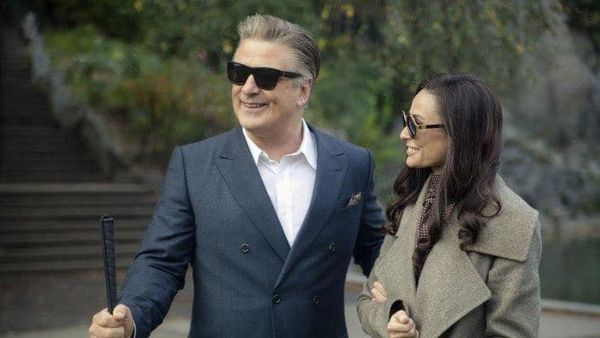Eye For Film >> Movies >> Blind (2017) Film Review
Blind
Reviewed by: Jennie Kermode

It's said that there are none so blind as those who will not see. Any woman who asks, "But what are you doing with the personal account?" and accepts being told that it's complicated, darling, may as well be putting the blinkers on herself. Indeed, Suzanne (Demi Moore) does so almost literally, hiding her face behind the kind of oversized dark glasses associated with abused wives. But is she, then, complicit? When her husband (Dylan McDermott) is arrested, a court gives her 100 hours of community service. He, jailed, assures her that he knows how to handle situations like this. She, a kept woman for decades, doesn't know how to handle anything.
For sometime author Bill (Alec Baldwin), getting hands-on is the easiest way to make sense of the world. His blindness is literal, occasioned by the car crash in which he lost his wife, but that doesn't mean he has no illusions. The usual dialogue emerges here about self pity (with no-one explaining why it's unreasonable) but Bill's problem is more prosaic: he's just obnoxious. Getting by on his past success, he has had no reason to break the habit; his disability has provided him with new ways to show off and new ways to make people feel obligated to him. When Suzanne walks through his door, legally obliged to read student essays for him and put up with his bullshit, she's the latest in a long line of easy targets. The challenge she presents to his expectations stems from the fact that she's beginning to challenge her own.
Baldwin is Baldwin. He has picked up the nuances of blind people's coping strategies very well, but brings little to his character beyond this. One might note that a blind actor, being free to focus on the important stuff, would have made a better lead, but this is self-consciously a star vehicle, and for all Baldwin's bluster, the stage is stolen from him despite that. Moore, so often miscast in her youth, has been waiting a long time for a role like the one she has here. Though much quieter and less showy, she comes to dominate the film, her reactions ultimately having more impact on the things that matter than the men's actions. It's the perfect opportunity for her to take on her own carefully crafted Hollywood image and show that beneath the sleek exterior there is someone fragile, fractious, and much more interesting.
Look beyond the central theme and associated lazy metaphors and this is a by-the-book romance. It even throws in a conventional sin for the husband towards the end so that we can pretend it's natural for Suzanne to have gone easy on the other ones. It is, however, gorgeously produced, with Michal Dabal's lucid cinematography a treat. There's some excellent set design, with conscious shifting between flat backgrounds and complex ones inviting the viewer to become more conscious of visible hazards and clues about character. Songs with visual themes seep into the subconscious, substituting for the depth of other sensory information available to Bill but not to the viewer.
All this converges to make Blind seem more sophisticated than it really is, ironically presenting us with a similar illusion to those affecting the main characters. It's Suzanne, despite her weakness in falling for the first man to pay her attention, who ultimately emerges as the more substantial of the three, salvaging the film in the process, and Moore is to be credited for that.
Reviewed on: 10 Jul 2017
















